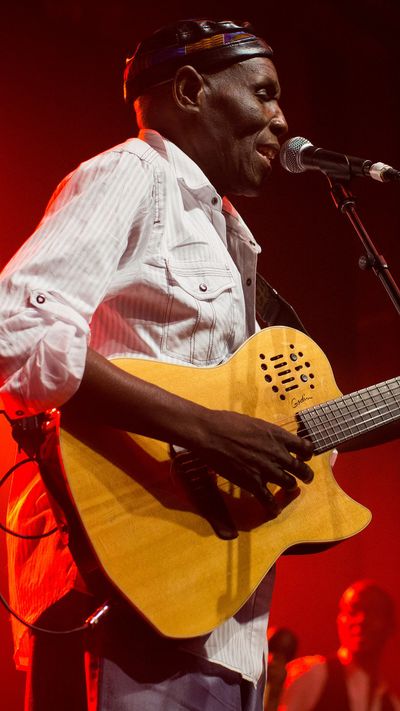A Tribute to Tuku: The Man Whose Music Both Raised and Healed Me
One fan pays tribute to the late Oliver Mtukudzi and the impact of his music on her life.
My father died on a Tuesday. A few days later, I took the two-day-long bus ride to Zimbabwe to go and bury him in his village, among his people. Two weeks later, on the bus ride back to South Africa, I suddenly realized that life had lost a whole lot of color. Back at university, I'd stare into space, look at the ceiling or the blank walls of my dormitory or simply weep.
I eventually resumed my listening to Tuku's music as I studied or read up for my classes. It was months later, as I studied for my final exams, that I realized the one of the constants that would forever link me to my father: Oliver Mtukudzi's music.
As a Zimbabwean child growing up, the house was always filled with Tuku's music. Having not grown up in the village like my parents, my mastery of Shona was conversational at best. And so many a time, when Tuku invoked his characteristic rich metaphors, I would ask my mother to translate what he was saying.
Now aged 24, there is not a time I can remember that Tuku's music has not constantly been on my favorite playlist. Every time I have played a song of his, be it Tapera, Raki, Tozeza Baba or Mutserendende, it has brought on a bout of nostalgia. I am always transported to a specific place and time, particularly that of my childhood. I recall the long drives down to Zimbabwe we would take as a family and how my parents' entire discography of Tuku would accompany us: past the border, past the endless savanna and up-side-down trees, until we had reached home. I knew the playlist so well that as soon as one song ended, I knew which one would be playing next. Before I knew contemporaries such as Ciara and her one-two step or Usher and his burning confessions, I first knew Tuku.
My heart is sore in so many ways. It's always a sad affair when anyone dies but Tuku was a musician who, for many Zimbabweans especially, felt like a family member of sorts. He was just always there. Whether he was telling a young girl to go home because it was getting dark outside in Kunze Kwadoka or he was talking about the tremendous luck some men had in Raki, Tuku was always there.
I personally derived a lot of healing from listening to Tuku after my father died. In Tuku's music, there were so many places I wanted to revisit, places that did not yet know that my father had died. Tuku had the key to the many good memories of my father that I was so desperate to unlock. Memories that would not make me sad and an endless fountain of tears, but memories instead of a father who showed up to every school prize-giving ceremony I ever had. Memories of a father who would give everyone an earache when his daughter excelled or reached a milestone. Memories of a father who loved me so much so that I often struggled to understand why.
In Tuku's 'manje wangu wanhasi, kukwire gomo', there was comfort because I was not climbing those endless mountains alone. There were others just like me. In Tuku's 'kuseri kweguva hakuna munamato varume', I was reminded that my efforts were in vain if they were not made before I entered the grave, that living and living right, was something I should aspire to do before I no longer had the breathe with which to do it. If I could take Tuku's lyrics and bind them all, they would be my gospel.
There was a simple and yet deeply reflective touch to all his music. Whether it was in the sad and widely beloved song Neria, talking about the life of a bereaved widow, or in the mischievous 'cough-laugh' he became known for, Tuku was a symbol of exquisite profundity. In Bvuma, he let dictator Robert Mugabe know that Zimbabwe no longer wanted his raggedy ass in power and that his time was up. I am so very glad he got to see that day. In Tsika Dzedu he asked Zimbabweans what had happened to our cultural practices and why we had deserted them. And in Shamiso he celebrated his daughter's marriage as any delighted father would.
In every song, there was a message be it of hope, celebration, joy, sorrow or loss. And for that, I and so many others, are eternally grateful. Chizorora Tuku.
